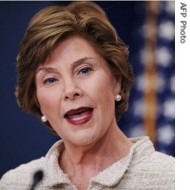VOA标准英语2008年-Beef Protests Greet Bush in South Korea
时间:2019-02-12 作者:英语课 分类:VOA标准英语2008年(八月)

President George W. Bush and wife Laura arrive at Seoul military airport, 05 Aug 2008
This is likely to be Mr. Bush's last trip to Asia as president. And he has a full agenda for his talks with South Korean, Thai and Chinese leaders - from North Korea's nuclear ambitions, to trade, to human rights.
In Seoul, he will discuss security and finance matters with President Lee Myung-bak. But North Korea is likely to be the issue that hangs over all else.
President Bush has said he welcomes North Korea's recent declaration of its plutonium enrichment activities, and the destruction of the cooling tower at its Yongbyon reactor 1. But he says the North must still agree to a verification process.
"They're a highly sanctioned regime," said the U.S. president. "And, as I said, they've got a lot of obligations that they must fulfill 2 in order for these sanctions to leave."
Protests over US beef imports delayed president's visit to Seoul

South Korean protesters perform during a rally against U.S. President Bush's visiting in Seoul, 05 Aug 2008
Mr. Bush was originally expected to visit South Korea last month. But the trip was postponed 3 following massive demonstrations 4 in Seoul against imports of American beef.
Overall, passions have cooled in recent weeks. But as the president arrived in the South Korean capital, roughly 20,000 protesters gathered in the city. There were about a dozen arrests and there have been reports police used water cannons 5 to keep demonstrators from blocking a major city street.
All the same, there has been no word of any major clashes between demonstrators and some of the more than 16,000 law enforcement officers put on stand-by to handle any unruly crowds.
Trip to Thailand will include border visit for Mrs. Bush
Mr. Bush's reception in Thailand is likely to be much more sedate 6. Officially, he is going to Bangkok to mark the 175th anniversary of U.S.-Thai relations, and to deliver a speech that will be, in essence, an assessment 7 of his Asia policies.

U.S. First Lady Laura Bush (file photo)
But going to Thailand also provides an opportunity to highlight conditions in neighboring Burma. It will also give First Lady Laura Bush, who has made Burma a personal cause, a chance to tour a refugee camp on the Thai-Burmese border and meet face to face with some of the victims of Burma's military regime.
"The more I've seen, the more critical I see the need is for the people in Burma to be for the world to pay attention to the people of Burma, and for the world to put pressure on the military regime," she said.
From Thailand, the president and Mrs. Bush will go to Beijing, where he will be playing two roles: leader of the United States and sports fan.
Bush looking forward to Beijing Olympics, despite criticism over human rights
He says he will raise concerns about human rights and other issues with Chinese leaders in private, but will not use the Olympics to make a political statement.
"I am looking forward to cheering the athletes," said President Bush. "I think it will be - I think it would be good for these athletes who have worked so hard to see their president waving the flag."
During an interview with The Washington Post newspaper, conducted during the flight from Washington to Seoul, the president talked about the evolution of U.S.-China relations during his years in office.
He praised China's efforts to curb 8 the nuclear ambitions of both North Korea and Iran. But he acknowledged it is very difficult to determine if there has been any improvement in human rights in China over the last eight years. And he expressed disappointment that Chinese actions helped scuttle 9 the latest round of world trade talks.
- The atomic reactor generates enormous amounts of thermal energy.原子反应堆发出大量的热能。
- Inside the reactor the large molecules are cracked into smaller molecules.在反应堆里,大分子裂变为小分子。
- If you make a promise you should fulfill it.如果你许诺了,你就要履行你的诺言。
- This company should be able to fulfill our requirements.这家公司应该能够满足我们的要求。
- The trial was postponed indefinitely. 审讯无限期延迟。
- The game has already been postponed three times. 这场比赛已经三度延期了。
- Lectures will be interspersed with practical demonstrations. 讲课中将不时插入实际示范。
- The new military government has banned strikes and demonstrations. 新的军人政府禁止罢工和示威活动。
- Cannons bombarded enemy lines. 大炮轰击了敌军阵地。 来自《简明英汉词典》
- One company had been furnished with six cannons. 某连队装备了六门大炮。 来自《简明英汉词典》
- After the accident,the doctor gave her some pills to sedate her.事故发生后,医生让她服了些药片使她镇静下来。
- We spent a sedate evening at home.我们在家里过了一个恬静的夜晚。
- This is a very perceptive assessment of the situation.这是一个对该情况的极富洞察力的评价。
- What is your assessment of the situation?你对时局的看法如何?
- I could not curb my anger.我按捺不住我的愤怒。
- You must curb your daughter when you are in church.你在教堂时必须管住你的女儿。